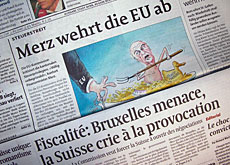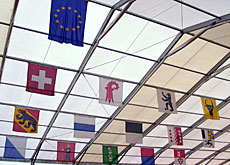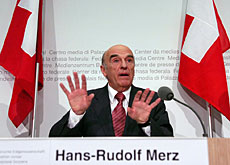Swiss media toe government line in tax debate

The Swiss press has weighed in behind the government in rejecting criticism by the European Commission of the low corporate tax rates in some Swiss cantons.
Writing in Wednesday’s papers, a majority of commentators denounced the “pressure” being applied by Brussels on non European-Union Switzerland.
On Tuesday the Commission said corporate taxes offered by cantons including Obwalden and Zug violated a 1972 trade agreement, calling it a disguised state subsidy. It called on the Swiss to amend their policy and negotiate with the EU.
Swiss Finance Minister Hans-Rudolf Merz shot down the EU proposal, saying there were no contractual regulations between Switzerland and the EU that require harmonisation of company taxation.
There was also strong criticism from politicians and the business world.
The Neue Zürcher Zeitung said the EU’s attempt to get involved in Swiss tax affairs showed “bad style and little respect” towards Switzerland.
It said the European Commission’s demand had pushed the row over corporate tax onto a political level.
“Bern has to keep its cool, as it’s all about national-political principles,” wrote the newspaper, “and it’s not about insignificant things economically but about the country’s future as a location for mobile corporate enterprises”.
The present situation had to remain as it was, despite Brussels’ jealousy and suspicion, it added.
Pressure
Another Zurich paper, the Tages-Anzeiger, also placed itself firmly behind the cabinet, advising ministers to withstand the pressure from the EU.
It said it could understand that the Swiss system did not suit the European Commission, which was defending its financial interests.
However, the Swiss government had to defend the interests of its citizens, who through the Swiss tradition of direct democracy had been confronted with Europe and integration issues much more than any other country.
This included the vote over extending Swiss aid to the ten new EU countries, which was accepted by the population last year. This led to a debate over Europe and had a clear result.
“This democratic legitimisation… is the most important argument in this conflict of interests with Brussels,” wrote the Tages-Anzeiger.
Astonished
The French-language 24heures was astonished by the commission’s interpretation of the 1972 free trade agreement, which it called “legally very questionable”.
Criticism of the commission was echoed by other newspapers in the French part of the country. The Geneva-based Le Temps entitled its commentary “the shock of convictions”. It said Brussels had condemned Swiss tax practices and called for good fiscal behaviour from Switzerland. This stance was the fruit of a logical argument and of exasperation on the part of the EU.
It said the commission had justified its stance through the strong bilateral relations with the Swiss and by the fact that Switzerland was a privileged political and economic partner of the EU. The EU is Switzerland’s largest trading partner.
But it said the Commission did not have the exclusive right to benefit from competition.
The Tribune de Genève came up with a novel solution – which was that “all the cantons lower or even abolish totally the tax on company profits, whether they are foreign or Swiss”.
Other regional newspapers, such as the Quotidien Jurassien, worried about the consequences of the hard line taken by the EU.
This could lead to isolation, it said. “But on the other hand, politically Switzerland is not untouchable. Nor irreproachable.”
Outside Switzerland, the Financial Times said the commission’s move reflected “the frustration felt in a number of European capitals” about the growing number of companies that are moving their headquarters or distribution centres to Switzerland.
“Should a negotiated settlement prove elusive,” the paper warned, “Brussels said it could also impose ‘safeguard’ measures such as punitive tariffs on Swiss exports to the EU”.
swissinfo, Isobel Leybold-Johnson
Switzerland is convinced that the procedures for taxing management companies, mixed companies and holding companies in the country do not fall within the scope of the 1972 free trade agreement.
The 1972 accord exclusively governs the trading of certain goods (industrial and agricultural processed products).
Bern says when signing the accord, neither Switzerland nor the European Economic Community intended to harmonise their laws either with regard to goods or in the areas of competition or state subsidies.
It argues that the provisions of the accord are not to be interpreted in the same manner as the EEC treaty’s more detailed rules on competition.
Criticism that allocates responsibility to Switzerland as a participant in the internal market without legal justification is also rejected.

In compliance with the JTI standards
More: SWI swissinfo.ch certified by the Journalism Trust Initiative




You can find an overview of ongoing debates with our journalists here. Please join us!
If you want to start a conversation about a topic raised in this article or want to report factual errors, email us at english@swissinfo.ch.